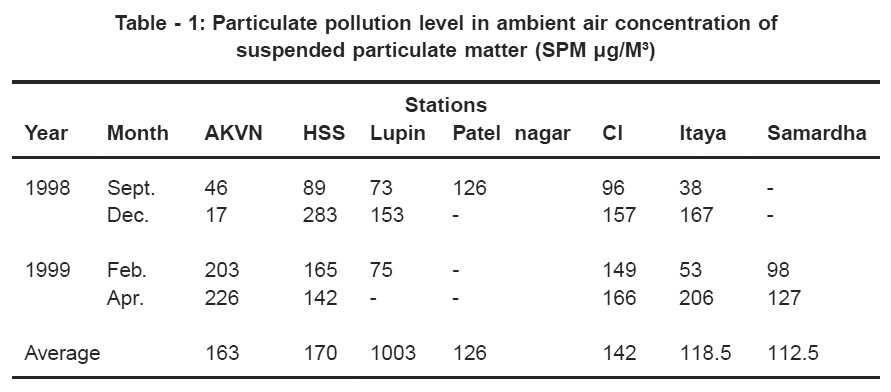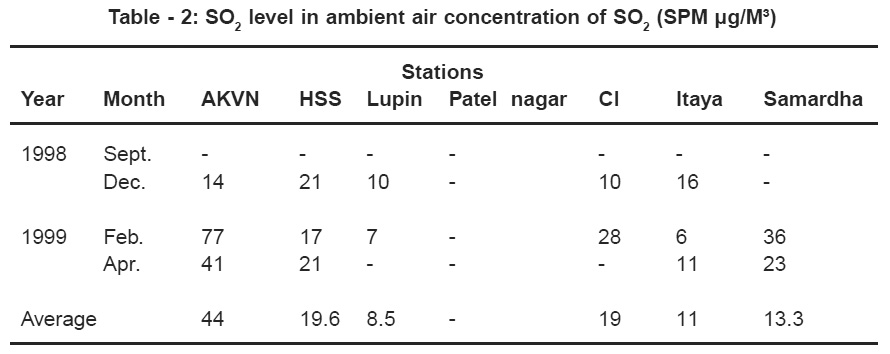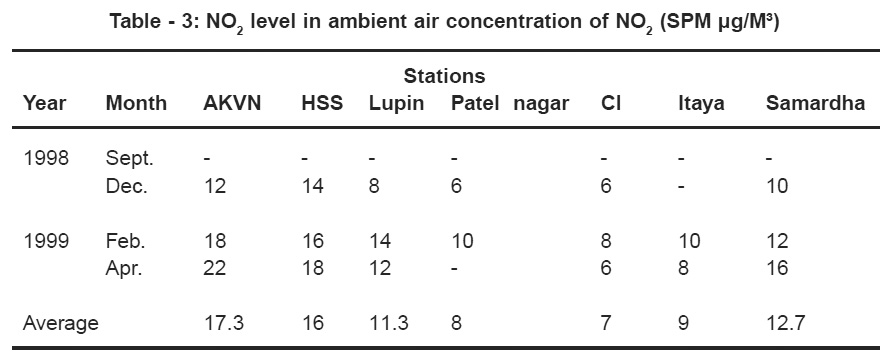Studies on ambient air quality out side of Electro-graphite industry of Mandideep area, Bhopal (India)
Anand Sharma1 * and D.R. Tiwari2
1
Department of Chemistry,
Government, M.V.M,
Bhopal,
462 001
India
2
Department of Geology,
Government, M.V.M,
Bhopal,
462 001
India
DOI: http://dx.doi.org/10.12944/CWE.2.1.13
Ambient air quality studies around Mandideep Industrial area was carried out during the period May 1998 to June 1999. Air samples were collected and analysed on a number of monitoring sites. The parameter include SO2, NO2 and SPM concentrations. Results are discussed with respect to possible impact on human health.
Copy the following to cite this article:
Sharma A, Tiwari D.R. Studies on ambient air quality out side of Electro-graphite industry of Mandideep area, Bhopal (India). Curr World Environ 2007;2(1):67-69 DOI:http://dx.doi.org/10.12944/CWE.2.1.13
Copy the following to cite this URL:
Sharma A, Tiwari D.R. Studies on ambient air quality out side of Electro-graphite industry of Mandideep area, Bhopal (India). Curr World Environ 2007;2(1):67-69. Available from: http://www.cwejournal.org/?p=635
Download article (pdf) Citation Manager Publish History
Select type of program for download
| Endnote EndNote format (Mac & Win) | |
| Reference Manager Ris format (Win only) | |
| Procite Ris format (Win only) | |
| Medlars Format | |
| RefWorks Format RefWorks format (Mac & Win) | |
| BibTex Format BibTex format (Mac & Win) |
Article Publishing History
| Received: | 2007-03-25 |
|---|---|
| Accepted: | 2007-05-21 |
Introduction
Due to rapid industrialization it lead to air pollution. Beside that out unplanned and excessive exploitation of available natural recourses have been also a causing for pollution problem in major cities line Bhopal Capital of Madhya Pradesh. Air pollution is mainly affecting the urban environment all over the world. (Ledder better 1973 and Painter 1974). Although ambient air quality is being monitored regularly in the city are of study. The main problem of pollution is due to the industrial units are located close to residential pollution. Emission form such industrial units may exert hazardous effects which is compounded by automobiles emission (Sundaresan 1991).
Mandideep as an industrial growth center developed by AKVN where, over 60 medium and Large Scale Units are running successfully. It includes mainly Chemical, Electro graphite, Dyes Plastic and Rubber Industries etc.
Material and Methods
The main objective of ambient air quality monitoring (AAQM) is to assess the existing ambient Level of air pollution. The SPM, SO2 and NO2 concentration were observed at 7 sampling station in September and December 98 and February and April 1999. These stations were located in different direction and were at distance from 0.5 to 5.0 Km form the plant premises. The parameter chosen for AAQM were suspended particular matte (SPM), Sulfur dioxide (SO2) and Nitrogen dioxide.
Sample were collected round the clock during survey period. The gaseous pollutant SO2 and NO2 were collected on 8 hourly. For simultaneous particulate and gaseous sampling a tapping was provided in the hopper of the Hi-vol. Sampler for creating necessary suction head. The sample of gases were drawn at 0.5 Lit/min. flow rate. The samples were analysed as per standard method.
 |
Table - 1: Particulate pollution level in ambient air concentration of suspended particulate matter (SPM μg/M³) Click here to view table |
SPM samples were collected with Hi-vol., samples operated at the rate 1.5 M3/min. The ambient SPM concentration were determined by collecting the particulate matter for 24 Hrs. on a pre-weighed glass fiber of 20 × 25 size and re-weighed after sampling. In order to avoid humidity factor and other material losses. The filter paper were always oven dried at 80°C and kept in desiccators before weighing. The SPM results are reported monogram before weighing. The SPM results are reported monogram per cubic meter of air drawn through filter (µg/m3).
Sulfur dioxide (SO2) was measured by using wet Chemical method devised as per reference EPA methods, which is a modification of west and Gaeke.
Nitrogen dioxide (NO2) was collected by bubbling air through Sodium Hydroxide, Sodium arsenite solution to form a stable solution of sodium nitrate. The nitrate ion produced, sulronamide.1 Nepthyle elthylene diamine diahydrochloride to form an A2O dye and then determined calorimetrically at 550mm
 |
Table - 2: SO2 level in ambient air concentration of SO2 (SPM μg/M³) Click here to view table |
 |
Table - 3: NO2 level in ambient air concentration of NO2 (SPM μg/M³) Click here to view table |
Results and Disussion
The observed value of SPM concentration at different sampling station are given in Table 1. A peak of SPM concentration of 283 mg/m3 was noted in December 98at higher secondary school (1Km NW) followed by that of 226 μg/M3 in April 99 for AKVN office compound (1.5 km) 206 µg/m³ in April 99 for Itaya (3 Kmg.E) of 166 μg/m3 in December 98 for Luppeir Laboratories (2.5 Km.NE) abd 127 µg/m3 in April 99 for Samardha (5 Km NE). Excepting at Higher Secondary School the SPM values at all places were followed to be maximum in April and minimum in September. The observed SO2 concentration value of different locations are given in Table -2.
The sulfur dioxide concentration on the observed sites was measured in December 1988 and February and April 99. The minimum and maximum SO2 levels including all the places were between 8.6 and 77 µg/m3. The highest values of 77 µg/m3 were recorded at AKVM office compound, but at other places the levels were very low and there was a indication of a seasonal variation in the pollutant concentration in the area of study. The observed values of concentration of NO2 at different locations7 are given in Table -3.
In the persent study, it is clear that the minimum and maximum NO2 levels including all places were between 6.0 and 22 µg/m3. The highest value of 22 µg/m3 NO2 recorded at AKVN office compound but at places the levels were very low.
From the data on air quality in about 5Km radius around the plant premises. It can be concluded that the concentration of SPM, SO2 and NO2 were much below the standard laid down for these pollutants for industrial cum residential (mixed) area.
References
-
Ledder betu, JS. Air pollution Mercel Dekker, Inc New York 1(1973).
-
Painter, D.E. Air pollution Technology, Reston Publ. Comp.London (1974).
-
Sundaresan, BB., Air Pollution: The Dangerous Dimensions in Survey of the Environment. The Hindu Madras, (1991) pp 81-83.
-
Gold Smit J.R and Friborg “Effect of Air pollution on Humand Health. In Air pollution (1977) pp 458-610.
-
Godstein I.F. and A.L.Weinstein., Air Pollution and Asthma effect of exposures to short form Sulper dioxide places, Envionment Res. (1986) 40: 332-45.
-
Shafford D.A. J.A. Nadel and H.A. Boushey., Exercise increases Sulphor dioxide induced brocho constriction in Asthametic subjects. Amor, Reve. Respir Dis, (1981) 123.







